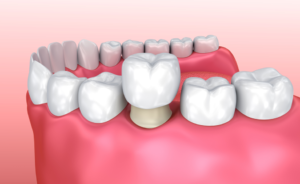
If you’ve just received a temporary dental crown, you might be feeling a mixture of emotions—perhaps you’re excited that you’re finally on your way to restoring your smile’s health and beauty, but you might also be a little concerned about how to care for your temporary restoration while your final one is being created. Continue reading below for some must-know, dentist-approved tips that are certain to help you provide adequate care for your temporary restoration so that once the permanent one is ready, you’re set up for success!
Tip #1. Don’t Eat Immediately
Even though your temporary crown is meant to be replaced eventually, you shouldn’t do anything that might harm it—including eating too soon! To avoid problems, wait about 30 or so minutes before eating once the crown has been cemented and set at the office. This way, you’re greatly minimizing the risk of anything going wrong with it!
Tip #2. Avoid Certain Foods
Simply put, certain foods are bound to dislodge or damage a temporary dental crown. Avoid items like caramel, taffy, chewing gum, or anything else sticky or gummy that might pull the crown loose. Also avoid particularly hard or crunchy items like granola, nuts, corn on the cob, popcorn, apples, and tough hunks of bread. Stick with soft foods, instead: oatmeal, mashed potatoes, applesauce, soup, and smoothies are all excellent options. Finally, be sure you’re not eating or drinking anything too hot or too cold!
Tip #3. Chew on the Opposite Side of Your Mouth
As an added precaution, you should be certain to chew on the opposite side of your mouth from where the crown is. This is especially helpful during the first few days, since your mouth might be sore, and you also don’t want the crown to become dislodged. This might take a little getting used to, but since you shouldn’t be eating anything that requires much chewing anyway, it isn’t a tough adjustment to make!
Tip #4. Maintain Excellent Oral Hygiene
Patients must brush their teeth three times a day and floss daily while they have a temporary crown—ideally after each meal. Even rinsing a few times a day with an antibacterial mouthwash can go a long way; this all helps to reduce the risk of infection while the temporary crown is in place. Fewer problems now mean fewer problems in the future with your permanent restoration! It’s also worth mentioning that while temporary crowns have their usefulness, some dentists are now capable of providing crowns within a single day—so don’t hesitate to speak with your dentist about your options.
About the Author
Dr. Brad Heim received his dental doctorate from the University of Connecticut School of Dental Medicine and has proudly served the dental needs of the Glastonbury community for several decades! The practice is thrilled to offer a wide range of services, including numerous restorative options like dental crowns. If you have any questions about the blog or you’d like to schedule a visit for you or someone you know, feel free to contact Dr. Heim and his team through their website or over the phone for additional information or assistance. Telephone: (860) 633-2031.







